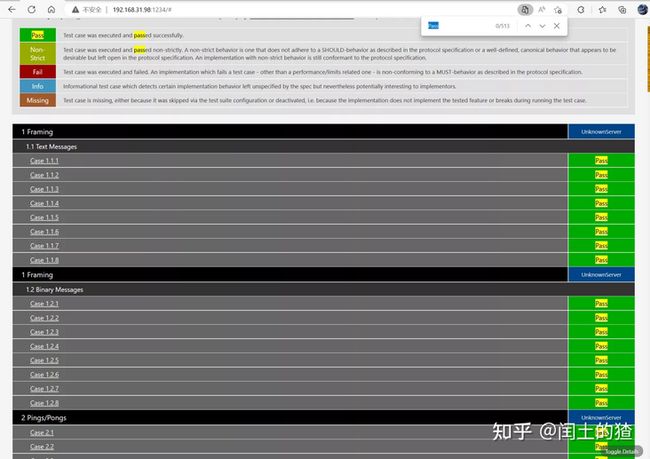话不多说先上测试结果
- machine: MacBook Pro M1
- body.json size: 2.34KiB
- max cost: cpu=440% memory=90MiB
- command:
tcpkali -c 200 -r 20000 -T 20s -f body.json --ws 127.0.0.1:3000/connect
lxzan/gws
Destination: [127.0.0.1]:3000
Interface lo0 address [127.0.0.1]:0
Using interface lo0 to connect to [127.0.0.1]:3000
Ramped up to 200 connections.
Total data sent: 28864.1 MiB (30266158036 bytes)
Total data received: 28812.3 MiB (30211911226 bytes)
Bandwidth per channel: 120.909⇅ Mbps (15113.7 kBps)
Aggregate bandwidth: 12080.082↓, 12101.773↑ Mbps
Packet rate estimate: 1098496.2↓, 1105141.9↑ (8↓, 14↑ TCP MSS/op)
Test duration: 20.0078 s.
gorilla/websocket
Destination: [127.0.0.1]:3000
Interface lo0 address [127.0.0.1]:0
Using interface lo0 to connect to [127.0.0.1]:3000
Ramped up to 200 connections.
Total data sent: 15043.6 MiB (15774402996 bytes)
Total data received: 14990.0 MiB (15718181647 bytes)
Bandwidth per channel: 62.972⇅ Mbps (7871.5 kBps)
Aggregate bandwidth: 6285.944↓, 6308.428↑ Mbps
Packet rate estimate: 589201.4↓, 579598.1↑ (5↓, 12↑ TCP MSS/op)
Test duration: 20.0042 s.
亮点
- 无依赖
- 不需要开启额外协程监听消息, 处理各种事件
- 读写消息不返回错误, 它们在gws内部被适当的处理了
- 事件驱动
- 通过了 autobahn-testsuite 所有的WebSocket Protocol测试用例
安装
go get -v github.com/lxzan/gws@latest
核心接口
type Event interface {
OnOpen(socket *Conn)
OnError(socket *Conn, err error)
OnClose(socket *Conn, code uint16, reason []byte)
OnPing(socket *Conn, payload []byte)
OnPong(socket *Conn, payload []byte)
OnMessage(socket *Conn, message *Message)
}
快速开始
package main
import (
"fmt"
"github.com/lxzan/gws"
"net/http"
)
func main() {
var config = &gws.Config{
CompressEnabled: true,
CheckTextEncoding: true,
MaxContentLength: 32 * 1024 * 1024,
ResponseHeader: http.Header{"Server": []string{"gws"}},
}
var handler = new(WebSocket)
http.HandleFunc("/connect", func(writer http.ResponseWriter, request *http.Request) {
socket, err := gws.Accept(writer, request, handler, config)
if err != nil {
return
}
socket.Listen()
})
_ = http.ListenAndServe(":3000", nil)
}
type WebSocket struct{}
func (c *WebSocket) OnClose(socket *gws.Conn, code uint16, reason []byte) {
fmt.Printf("onclose: code=%d, payload=%s\n", code, string(reason))
}
func (c *WebSocket) OnError(socket *gws.Conn, err error) {
fmt.Printf("onerror: err=%s\n", err.Error())
}
func (c *WebSocket) OnOpen(socket *gws.Conn) {
println("connected")
}
func (c *WebSocket) OnPing(socket *gws.Conn, payload []byte) {
fmt.Printf("onping: payload=%s\n", string(payload))
socket.WritePong(payload)
}
func (c *WebSocket) OnPong(socket *gws.Conn, payload []byte) {}
func (c *WebSocket) OnMessage(socket *gws.Conn, message *gws.Message) {
socket.WriteMessage(message.Typ(), message.Bytes())
message.Close()
}
测试
docker run -it --rm \
-v ${PWD}/config:/config \
-v ${PWD}/reports:/reports \
crossbario/autobahn-testsuite \
wstest -m fuzzingclient -s /config/fuzzingclient.json

